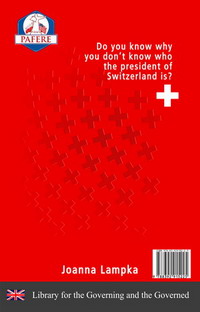Do you know why you don't know who the president of Switzerland is?
 Basic info
Basic info
| Title: | Do you know why you don't know who the president of Switzerland is? |
| Author: | Joanna Lampka |
| Category: | Direct Democracy; |
| Key words: | Direct Democracy; Switzerland; Political System; Where does wealth come from?; PAFERE; Library for the Governing and the Governed; |
| Publication date: | 2017, February |
| Available in: |


|
|
ISBN |
|
| Formats: | |
| Size: | |
| Weight: | |
| Pages: | 60 |
 Contact
Contact
| Email Address |

|
| Phone Number | +48 22 646 74 24 |
 Description
Description
The book is a collection of facts and curiosities important for understanding what direct democracy is all about. A president who goes alone by a public train? Well, yes! After all, the image and dignity of the office would suffer. And there is no cavalcades of cars on the signal rushing down cities? After all, how citizens will know WHO is going?
The book is written so clearly that it can be used as a material for conversations with young people (14+) on the subject of market, economic and political mechanisms.
 Endorsements
Endorsements
![]() The Swiss system of direct democracy, which is unique in our world of rule from the top down, allows citizens the power of the ref-erendum to propose and vote directly on their laws. In this decen-tralized political system, the Federation is competent on matters like national defense, the Cantons (which are like states in the U.S.) concern themselves with matters within their borders, and the Communes have jurisdiction over purely local concerns. This system precludes the extremes of mob rule and elite domination alike. Two Cantons still hold the annual open-air Landsgemeindein which every citizen can have his or her say. In the old days, they voted by raising a sword instead of a hand.
The Swiss system of direct democracy, which is unique in our world of rule from the top down, allows citizens the power of the ref-erendum to propose and vote directly on their laws. In this decen-tralized political system, the Federation is competent on matters like national defense, the Cantons (which are like states in the U.S.) concern themselves with matters within their borders, and the Communes have jurisdiction over purely local concerns. This system precludes the extremes of mob rule and elite domination alike. Two Cantons still hold the annual open-air Landsgemeindein which every citizen can have his or her say. In the old days, they voted by raising a sword instead of a hand.
Cow bells, fine cheese, chocolate, yodeling, skiing, the Matterhorn – these wonderful imagines of Switzerland belie deadly serious underpinnings. Switzerland managed to stay out of two world wars, but only because the great powers were forced to respect its armed neutrality. It refuses to join international crusades to make the world safe for this or that cause, but it provides diplomatic services and a neutral ground where warring parties can settle their differences. If Switzerland did not exist, it would be necessary to invent it.
With that I’ll let the reader move on to Ms. Lampka’s fine text. Although more than one country may lay claim to “exceptionalism” in its own unique way, Swiss exceptionalism is like no other, and the following pages explain why.
[Stephen P. Halbrook - the author of "Target Switzerland"]
 About the author
About the author
Joanna Lampka – born in Lublin in 1982. Writer, blogger and English translator (e.g. “The touch of silence” by Boleslaw Stelmach). The author of “Szwajcarskie Blabliblu” – the popular blog about society, people, culture and politics in Switzerland (www.blabliblu.pl). Since 2012, she has been living in Morges in the French-speaking part of Switzerland. A careful observer of the Swiss reality, fascinated by the mentality of the world’s richest nation, and trying to pass this enchantment on to her readers.
She writes basically about everything – from political and social essays, reports about Switzerland for travel magazines, to quite amusing and humorous texts. Her mission is to reach as many readers as possible, regardless of the complexity of the topic. She’s keen on music, sport (running, badminton, sailing, yoga), hiking and exotic travels.
 Reviews
Reviews
 Jan Kuban's review
Jan Kuban's review
At the end of 1989, I ended up in Switzerland, and a few things surprised me. One of them was that our village was always cleared of snow, and any residual snow was never a problem. “How do you do it?” – I asked my host – “In Warsaw, there is always a problem with that. If the snow is cleaned up at all, it is not done with any urgency.”. “We decide who is responsible for cleaning the snow. Every year, those who want to do it, give us the offers. Then we analyse these offers and we choose those that are cheap and reliable.” – was the answer. “We? Not the government?” – I thought.
In my first few days in Switzerland, I was shown one of the most impor-tant museums in a nearby town – a museum of an unknown entrepre-neur. “Is there really nothing else to be proud of, but some capitalist from 100 years ago?” – I was amazed that they thought so highly of a local businessman.
I was an ordinary worker and, one time, I was invited for a dinner with Hans – the owner of four diamond factories. There was basically no difference between his house and my boss’s house – the owner of a precision mechanics factory employing 20 people – or a skilled worker’s house.
I was fascinated by how this small country is organized and how it operated. Life there was much easier than in Poland, which was on the edge of bankruptcy at the time. At one point, I realised, that I did not know who is the president of this country. When I asked my host about it, he smiled and said: “You know, we basically do not have a president as in other countries.”
During another dinner, this time with a teacher, I was shown a satirical drawing of God in the heavens, with the Earth below, and the cries of: “God free us from hunger!”, “God save us from war!”, “God, help, there was a flood!”, and a small country marked with the Swiss flag: “God, could you increase the speed limit up to 130 km per hour?”. I was ashamed that I come from such a poor country, because I was neither smarter nor dumber than the Swiss. I decided to share the knowledge of how perfectly a country can be organized with my compatriots. I finally succeeded. Joanna wrote exactly what I wanted to write.
[Jan Kuban - Jan Kuban (born 1959) – a graduate of the Warsaw University of Technology, Faculty of Aeronautical Engineering, biocybernetics scientist, climber, alpine instructor, activist for direct democracy, polyglot, coach of young entrepreneurs, creator of information technology Q-Line, author the books: “The Physics of Life”, published in 2009 and “The 59 keys for understanding the beginning of life”, published in 2019 ]
 Topics which can really entice you
Topics which can really entice you
- Do you know the magic short cut formula for Switzerland's success?
- Do you know what Patrick Henry, best known for his “liberty-or-death” speech at the beginning of the American Revolution, said about the peasants of Switzerland?
- Do you know what Landsgemeinde {read it in the Monty Pyton's German pronunciation style} is?
- Do you know that Switzerland does not have an army?
- Do you know that the Swiss use magic to form their government?
- An of course you will discover why you don’t know who the President of Switzerland is.
 Table of Contents
Table of Contents
PAFERE...................................................................5
Library for the Governing and the Governed...............................5
Support .................................................................6
Joanna Lampka ...........................................................7
From the publisher ......................................................8
Foreword by Andrej Motyl the Ambassador of Switzerland in Poland ......9
Foreword by Stephen P. Halbrook.........................................12
1. Introduction ........................................................17
2 . Swiss citizens – the supreme authority of the state ................23
2.1 Direct democracy ...............................................23
2.2 Federalism .....................................................30
2.3 The political system in Switzerland ............................36
2.4 The profile of a Swiss politician – civil servant ..............40
3. The key to Switzerland’s success ...................................41
3.1 Why is Switzerland so rich? ....................................41
3.2 Swiss mentality ................................................47
Conclusion .............................................................50

